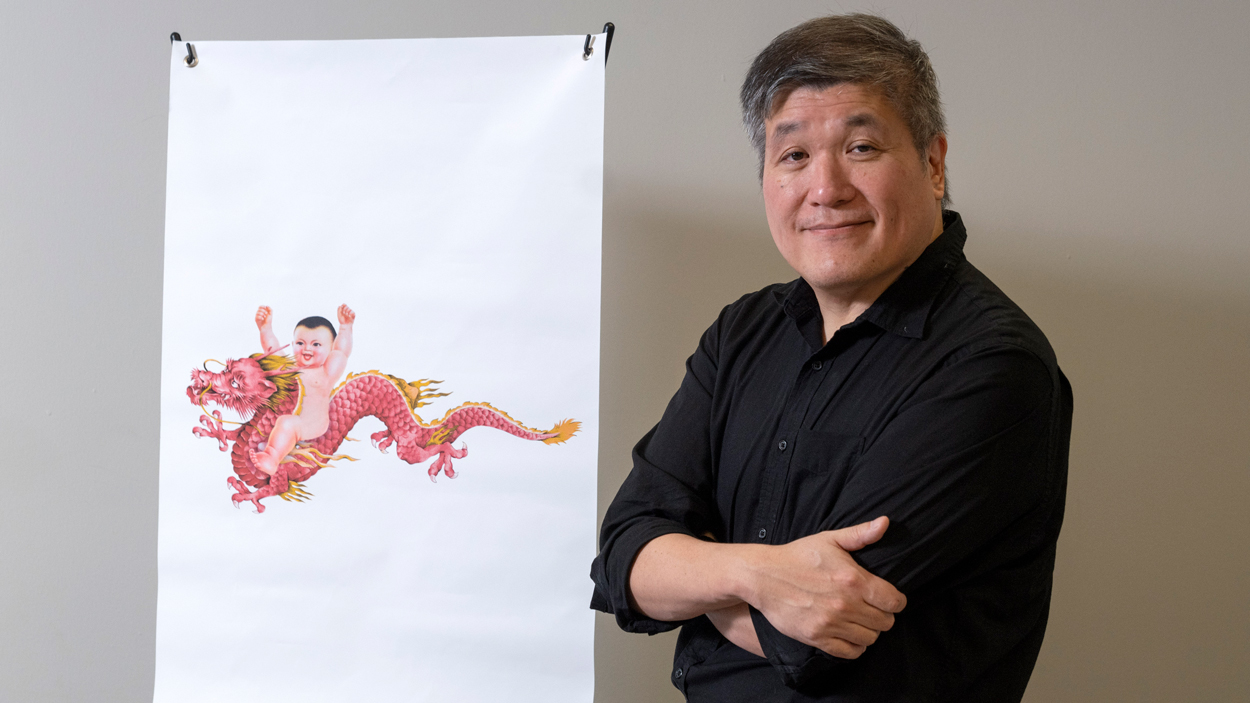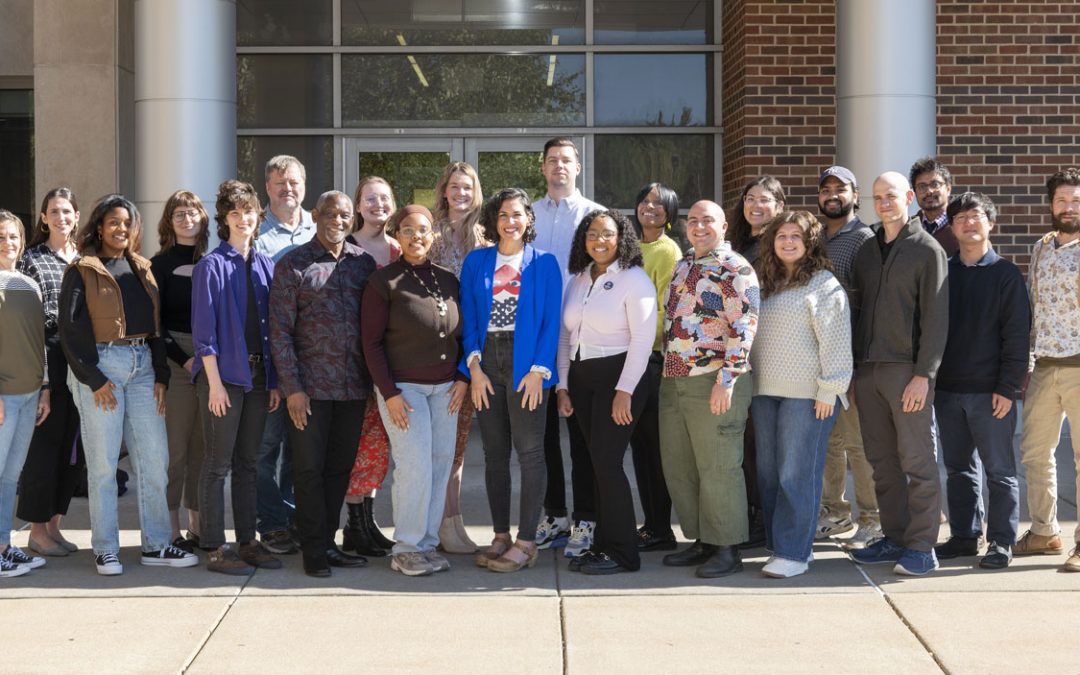
Professor Minsoo Kang published his debut novel, “The Melancholy of Untold History,” in July. He poses with a depiction of the “Naked Sky Baby,” one of many unique characters found in his book. (Photo by Derik Holtmann)
Minsoo Kang has never doubted what he wanted to do with his life.
“You know how most people have a time in their life where they don’t quite know what they want to do, and they go searching?” he said. “Weirdly, I never had that. You could have met me when I was 10 years old, and I would have told you, ‘I want to be a professor of history and write fiction.’”
Kang never wavered from that dual ambition, and he knows he’s fortunate not only because he’s always had a firm grasp on what would fulfill him professionally, but also because he’s achieved it.
In 2004, the first half of the equation came to fruition when Kang accepted an assistant professorship at the University of Missouri–St. Louis. He is now a full professor in UMSL’s Department of History, where he focuses on European history, with an emphasis in the cultural and intellectual history of France, England and Germany in the 18th and 19th centuries.
He realized the second half of that lifelong goal in July when William Morrow published his debut novel, “The Melancholy of Untold History,” a postmodern saga that interweaves the mythical and historical past of a fictional country, The Grand Circle, and the story of a grieving history professor in the present seeking solace.
Kang has been on a press tour the past few months, which he admits has been somewhat exhausting. He’s happy his book is finally in the hands of readers throughout the country.
“The thing that I love is the idea that I think up the stories, and I make them fun,” he said. “I take great care to write them as well as I can, and they’ll reach people that I’ll never meet all over the place. That’s a wonderful idea.”
Kang traces his interests in history and literature to a uniquely cosmopolitan childhood. His father was a diplomat for the South Korean government and that work took the family across the globe, including countries such as Brunei, Germany and Iran. However, it was Kang’s idyllic early childhood in Austria that sparked a lifelong fascination with European history.
A few years later, a job posting to New Zealand would have a considerable impact on his burgeoning literary tastes and development as a writer.
“I started learning English at the age of 11, and it was a deeply, deeply frustrating thing for me as an avid reader,” he said. “All of a sudden, I had to read at a rudimentary level. In Korean, I was reading way above my age level. I was struggling through books that were too young for me.”
Rather than submit to such a gradual language acquisition process, Kang hatched a plan. After his first year at school, he went to the bookstore intent on buying the longest novel he could find. The idea was to sit with the book and a dictionary during the school break and plow through it. He recognizes, in retrospect, that it was a “crazy thing” to attempt.
Browsing the shelves of the shop, Kang’s eyes just happened to fall upon an omnibus edition of J.R.R. Tolkien’s “Lord of the Rings” trilogy. The task ahead of him wasn’t easy. At the beginning of the endeavor, he had to look up every word in a sentence, but ultimately, he prevailed.
“By the time I got to ‘Return of the King,’ I could read entire paragraphs without looking things up,” he recalled. “It was a very special moment for me when I finished it, and I said, ‘Now I can read English.’”
Kang went on to pursue his college education in the United States. He earned a bachelor’s degree in interdisciplinary studies of history, philosophy and religion at the University of Southern California. The experience provided an opportunity for him to explore his interests, which, in the end, confirmed his dedication to the field of history.
At the University of California, Los Angeles, he earned a master’s degree and PhD in European history. He also sated his interest in philosophy by concentrating on cultural and intellectual history.
“I can’t do without stories, and I can’t do this thing philosophers do, where they just study ideas in abstract,” Kang said. “With intellectual history, I can do philosophy, but in the context of stories about intellectuals and philosophers’ lives and the times that they lived in. It’s really a history of ideas.”
Kang teaches his history students at UMSL how to think about the stories civilizations and cultures create and their evolution over time. He explains that the first stories civilizations tell typically center on gods, monsters and semi-divine heroes. They’re origin myths about great happenings in the supernatural realm.
As a civilization becomes established, it continues to tell those stories, but it also begins to add historical accounts of royalty and military leaders who achieved great things in society. Finally, when a civilization survives into the modern age, it becomes more interested in the lives and aspirations of ordinary citizens.
This progression from myth to history to ordinary life served as the basis for “The Melancholy of Untold History.” Kang wanted to explore further, but he didn’t want to do it as a historian bound by academic standards.
“What I ended up doing is I created an entire fictional country that greatly resembles China, but it also has elements of it from Korea, Mongolia, Manchuria and so on,” he said. “I tell the story of that civilization in those three modes. I’ve got the founding story about what happened with these four gods, four mountain gods, who used to be friends, but then they become enemies, and how that ends up having a major impact on the development of civilization in their region. Then I go on to episodes in the history of that country thousands of years later. Finally, we get to the modern era, where it’s a story about a history professor who’s studying all of this, while also dealing with some tragedy in his personal life.”
Each chapter alternates between myth, history and ordinary life, and through these different points of view, Kang invites readers to think about the very nature of stories. They can speak to triumphs and the best intentions of a society, but they can also be twisted and manipulated for nefarious ends.
“People have to be aware of that,” Kang said. “In my novel, I have examples of good stories, stories used as, for instance, means of resistance against tyranny, but I also have stories that I use for the sake of supporting tyranny and for the purpose of distorting reality.”
The novel touches on many philosophical ideas, but it’s also incredibly fun at the same time. Kang intentionally worked to include many comedic scenes, especially in the mythological sections dealing with the four gods.
Readers who enjoy the balance of entertainment and enlightenment in “The Melancholy of Untold History” are in luck. Kang has already written two other books in the same universe. He’s also written a stand-alone science fiction novel and is working on a campus novel.
Overall, Kang is grateful to be in a position where his scholarship fuels his creative writing and vice versa.
“The reason why I love doing both is that I love, love history because of the rules that you have to follow about doing thorough research, about understanding context and even doing proper citations, so that you give proper credit to people who have done work on it, and making sure that everything that I claim in a history book I can defend,” he explained. “I love all that. All of that is wonderful.
“But there’s a creative side that wants to break free and tell whatever story I want without the rules, just make stuff up, which I can’t do as a historian. But then once I spend a lot of time writing fiction, and that’s a lot of fun, I have this yearning to go back to the structure of doing historical research, right? I am extremely fortunate that I get to do both. That I get to indulge in my creativity, and then I get to indulge in my love of the process of writing proper history.”














